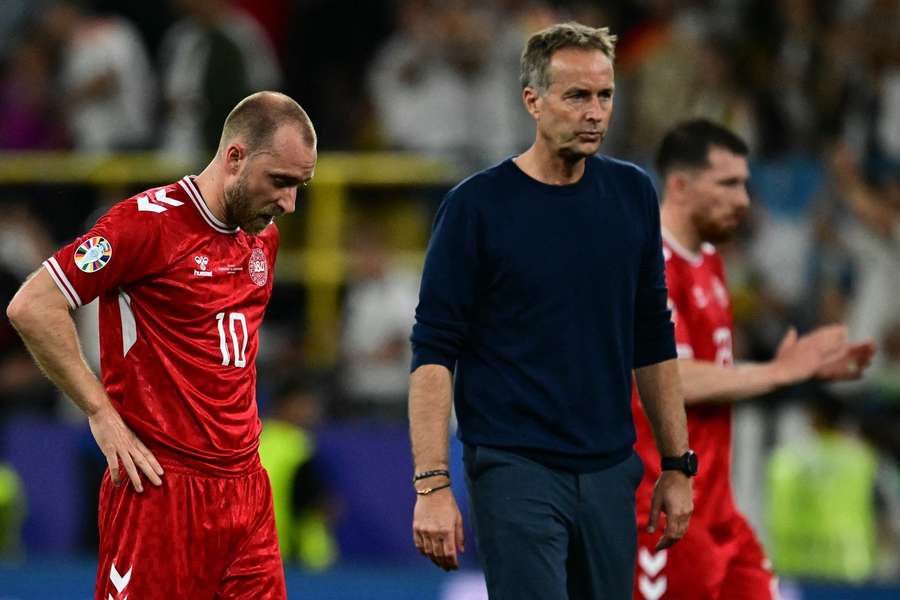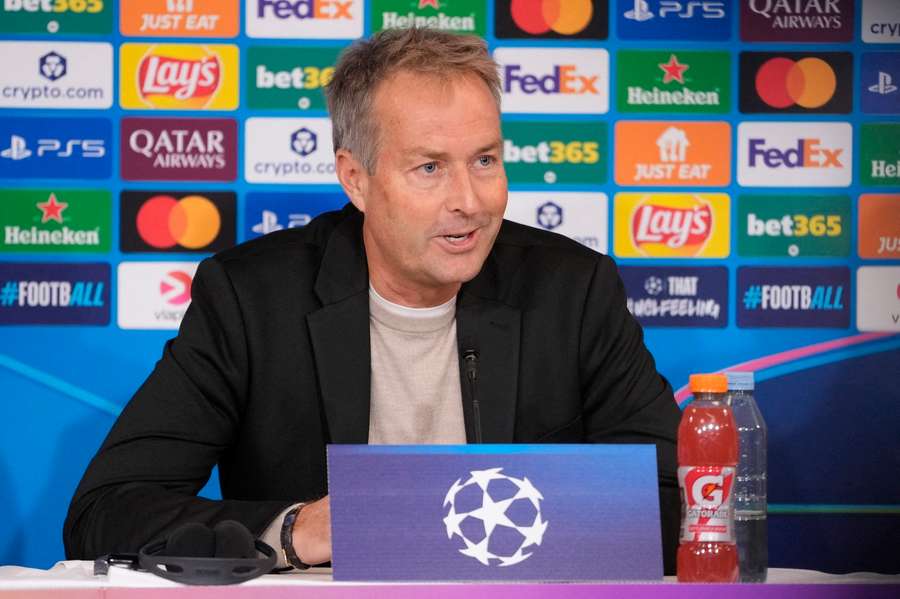On Wednesday, Hjulmand will revisit Copenhagen in an emotional return to the Parken Stadium, which he, as Danish national team coach, turned into a red and white fortress only for him to see his empire crumble when he, on the back of a disappointing EURO 2024 campaign, decided to bring down the curtain on his four-year reign in July last year.
The feelings towards Hjulmand in Denmark are ambiguous. There is a great devotion and respect for his humanitarian approach and his unusual leadership qualities. Still, the story of Hjulmand is also a tale of what might have been, of broken dreams and unfulfilled promises, as a man who, in the end, became everything he set out to change.
The image of Hjulmand will always be synonymous with the way he conducted himself with grace, poise, and humanity in the midst of incredibly testing circumstances when Christian Eriksen suffered a heart attack in the first game of EURO 2021. That instantly created a wave of sympathy around him and the Danish team, and on the pitch, they duly delivered by reaching the semi-final of the tournament.
Hjulmand arrived as an attacking-minded romantic to replace the successful pragmatist Age Hareide, and the experiment worked instantly as he invented Mikkel Damsgaard as a playmaker to replace Eriksen in a system with three frontmen, flexible wing-backs, and the now-retired Simon Kjaer in the shape of his life, leading a well-organised rearguard.
But leading up to the World Cup 2022 in Qatar, problems began to arise. Damsgaard fell victim to a long-term injury, and several profiles like Kasper Dolberg, Joachim Maehle, Andreas Christensen, and Eriksen failed to play regularly for their teams.
Denmark had a dreadful World Cup in Qatar, where they failed to get beyond the group stage, and despite a 1-1 draw against England, they never really fulfilled their potential at EURO 2024.
When he was put in charge of the national team in 2020, he was praised for his tactical innovation, his creative solutions, and his courage in not being afraid to experiment. But when results stagnated and the free-flowing football faded, Hjulmand failed to face the problems head-on. He became introverted, afraid, guarded, and never really responded to the increasing criticism.

From the start of his reign, he said that he would only select players who played regularly for their clubs and were in great shape. When he went back on that promise, selecting Eriksen, Kjaer, and Schmeichel even though none of them could live up to the criteria mentioned, criticism grew to monumental levels, perhaps especially when he failed to select Celtic's Matt O'Riley for EURO 2024.
That ultimately led to him stepping down in July last year to devote himself to a prestigious youth project launched by the Danish FA.
Now Hjulmand is in charge of Bayer Leverkusen, and the question is whether history will repeat itself.
His last stint with German football did not end well after he was appointed as Thomas Tuchel's replacement in 2014 at Mainz. He was dismissed after only one season as he, according to sporting director Christian Heidel, attempted to play a system he didn't have the right players for.
Leverkusen are now a team in search of an identity again after a severe "Umbruch" (radical change on a massive scale) after no less than 17 players left the club, including big profiles as Florian Wirtz, Granit Xhaka, Jeremie Frimpong, Jonathan Tah, and longtime captain Lukas Hradecky, while 21 have been brought in.
Follow Bayer Leverkusen's new players with the Flashscore app
With so many key players gone, there is a clear need for pragmatic solutions at Bayer Leverkusen following Alonso's elegant, eye-catching football with a different cast of starring characters, but the question is whether Hjulmand's flamboyant approach to football is the right solution in times when restraint rather than spectacle seems to be needed.
At Mainz, he used a back four, but with Denmark, he largely employed a 3-4-3 system, one that could potentially work for Leverkusen’s squad.
While Patrick Schick seems to be the only solution up front following Victor Boniface's departure for Werder Bremen, Leverkusen - unlike Denmark - have an embarrassment of riches in attacking midfield, despite Florian Wirtz’s transfer to Liverpool.
Malik Tillman is likely to take over from Wirtz if he stays fit, while the other No. 10 spot alongside him potentially could be covered by any one of the new arrivals, Claudio Echeverri (from Manchester City), Eliesse Ben Seghir (Monaco) or Ibrahim Maza (Hertha Berlin), or one of Nathan Tella and Jonas Hofmann.
Hjulmand employed three genuine centre-backs during his reign as Danish national team coach, with no midfielder or full-back usually filling in, and that could hand opportunities to Jarell Quansah, Edmond Tapsoba, and Loic Bade.
Hjulmand should be praised for his courage in stepping into the midst of a hurricane at Leverkusen. Now the question remains if charismatic Danes are the cure for the current headache in a city known for its production of aspirin.

